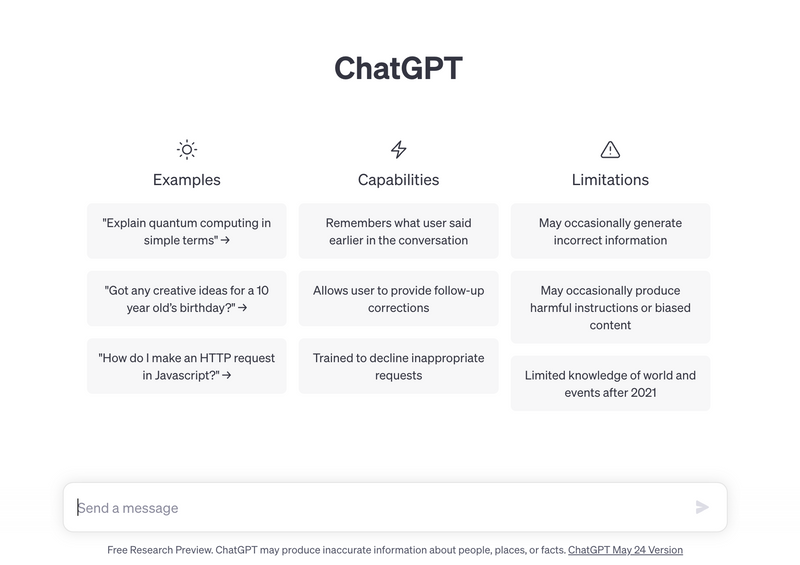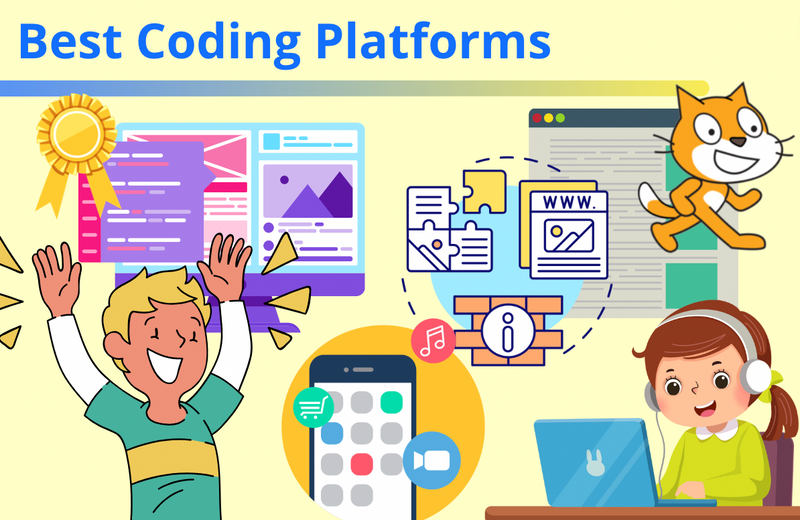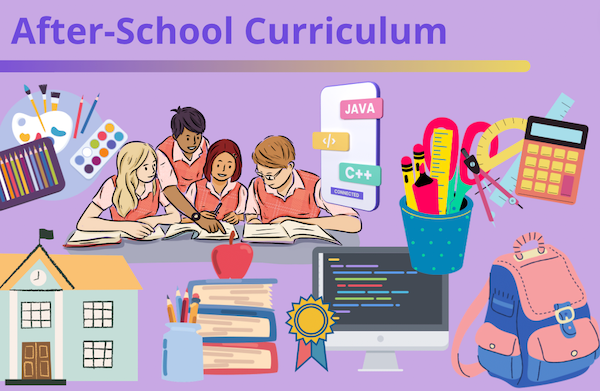Today many parents and educators have questions about ChatGPT for kids. Your children's learning today and their future have undergone a profound transformation with the recent introduction of ChatGPT. The ever-growing impact and capabilities of AI are capturing our attention now more than ever before, with daily headlines proclaiming its accomplishments: AI passing Google coding interviews, Wharton MBA exams, and Math & Computer Science Olympiad questions; AI aiding CEOs in idea generation and engineers in coding; AI triumphing over human artists in art contests, and much more.
The tipping point for AI was anticipated, yet when it arrived, it left virtually everyone astonished. As educators and parents, we find ourselves unprepared for this rapid change. Some schools have reacted by promptly banning AI, at least for now. However, most recognize that prohibition is not the answer, and instead, we must adapt our education system to this new reality. But how can we do so? Educational reforms often occur at a sluggish pace. How can individual parents, teachers, and educators assist their children or students in adapting to this new landscape? What knowledge should children acquire, and how can they leverage these novel tools to enhance their learning experiences? Today we'll explore ChatGPT for kids.
Jump right into learning with a live online Create with ChatGPT class for kids, led live by an expert, and designed by professionals from Google, Stanford, and MIT.
ChatGPT for Kids
ChatGPT is an exciting and educational tool that can spark curiosity and enhance learning for children. By engaging with ChatGPT, kids have the opportunity to ask questions and receive informative responses in a conversational manner. The tool can serve as a digital companion that encourages children to explore various topics, expand their knowledge, and satisfy their inquisitive nature. By embracing technology responsibly, parents can empower their children to use ChatGPT as a valuable learning resource that nurtures their intellectual growth and encourages a love for discovery.
What is ChatGPT?
To put it in the simplest form, ChatGPT is an AI product created by OpenAI that you can converse with and ask an incredibly wide range of questions from how to cook pasta, to travel recommendations, to coding, to solving calculus problems, and a whole lot more. It is so intelligent that it can pass Google Interviews, AP tests, and Bar exams just to name a few examples.
How do you use ChatGPT?
To use ChatGPT, just create a free account on the OpenAI website. Then type your questions or commands into the text box and click send message. Your requests can be simple or complex, long or short - it doesn't matter. For example, you could ask it to write a story about your favorite Pokemon, for help brainstorming a great lemonade stand name, or even ask it why the sky is blue. ChatGPT also saves a record of your conversations that you can view or continue at a later time, or delete.

Is ChatGPT safe for my child to use? And what measures are in place to ensure appropriate content and prevent harmful interactions?
Ensuring the safety of children while using ChatGPT is a crucial concern for parents. To address this, the OpenAI team went to extraordinary efforts to safeguard ChatGPT. You can learn more about what they have done at their blog on their Approach to AI Safety.
While AI systems like ChatGPT can generate valuable content, there is of course a need for vigilance in managing potential risks. Mathieu Fortier, director of machine learning at AI-driven digital experience platform Coveo, said that LLMs such as GPT-4 suffer from several imperfections and warned that despite their prowess in language comprehension, these models lack the ability to discern accuracy, immutable laws, physical realities, and other non-lingual aspects.
Experts say families should explore this technology together, thinking critically about its strengths and weaknesses. “The worst thing parents can do is forbid their child to use these new systems because they are here to stay,” said Justine Cassell, a professor in the School of Computer Science at Carnegie Mellon University who has studied how interacting with machines in humanlike ways can affect learning and communication. “Helping their child understand the positives and negatives is far more helpful.”
Organizations like Common Sense Media also provide guidance, suggesting that parents and educators should actively monitor and engage with children during their interactions with AI systems. By maintaining open lines of communication, setting clear boundaries, and promoting responsible use, parents can help ensure a safer experience for their children while utilizing ChatGPT.
If your child wants to use ChatGPT, have conversations about responsible and critical use of the internet with them. Here are five important topics to discuss:
- Understand that ChatGPT provides generated responses: Explain that ChatGPT is an AI language model that generates responses based on patterns it has learned from the text it was trained on. It doesn't have personal experiences or real-time information. Emphasize that not all generated answers may be accurate or reliable.
- Evaluate information sources: Teach your child the importance of checking the credibility of information. ChatGPT doesn't provide sources for its responses, so it's crucial for them to verify information from trusted and reputable sources outside of ChatGPT. Encourage them to seek information from books, educational websites, or consult an adult for reliable information.
- Being cautious with personal information: Emphasize the importance of safeguarding personal information online. Explain that ChatGPT is an AI and not a human, but it's still advisable not to share personal details such as full names, addresses, phone numbers, or passwords with any online platform or AI.
- Encouraging critical thinking: Help your child develop critical thinking skills by encouraging them to question and analyze the information they receive. Teach them to consider different perspectives, compare information from multiple sources, and think critically about the accuracy and reliability of the answers they receive.
- Setting boundaries and time limits: Establish guidelines for responsible technology use. Encourage your child to use ChatGPT as a tool for learning and exploration, but also set appropriate time limits for their online activities. It's important for children to engage in a balanced range of activities that promote their overall development.
Remember that parental guidance and supervision are crucial when children are using AI-based platforms to ensure a safe and educational experience.
How can ChatGPT benefit my child's learning and development?
ChatGPT can offer numerous benefits to your child's learning and development, as acknowledged by experts in the field. By engaging with ChatGPT, children have the opportunity to enhance their critical thinking abilities, boost creativity, and cultivate important executive functions. They can also learn a new language, play games, and get help with school work. Here are a few specific ways your child might enjoy using ChatGPT:
- Engage in interactive storytelling: Children can use ChatGPT to develop and refine their storytelling skills by creating interactive narratives, exploring different plot lines, and experimenting with character development.
- Improve writing skills: ChatGPT can assist children in improving their writing abilities by providing suggestions, offering feedback on sentence structure and grammar, and helping them develop more engaging and coherent compositions.
- Explore new subjects: ChatGPT can act as a knowledge resource, answering questions and providing explanations on various subjects, encouraging children to explore new areas of interest and expand their knowledge base.
- Develop coding and AI understanding: By coding their own ChatBot on top of ChatGPT, children can gain hands-on experience in programming, AI principles, and natural language processing, enabling them to develop practical skills for the future.
- Learn a new language: ChatGPT is a great language translator. The tool can not only translate text but also explain semantics and grammar to provide helpful context.
- Find a summer internship: ChatGPT can be a helpful resource for exploring different career paths and companies in specific industries.
Children often have curious minds and can ask ChatGPT a wide range of questions anytime. Here are some popular questions kids might ask ChatGPT:
- What is the tallest mountain in the world?
- How do airplanes fly?
- Why is the sky blue?
- What is the biggest animal in the ocean?
- How do plants grow?
- Why do we have seasons?
- How do computers work?
- What is the fastest land animal?
- How do birds fly?
- Why do we need to sleep?
- How do magnets work?
- Why is the ocean salty?
- How do spiders make webs?
- What causes thunder and lightning?
- How do volcanoes erupt?
Can ChatGPT replace human teachers and tutors?
ChatGPT has great potential to offer highly personalized learning for students. Because of this, almost all major education programs, such as Khan Academy, Quizlet, Duolingo, and Chegg, have integrated ChatGPT into their products. Students can also use ChatGPT directly (which is free). However, to get the best learning out of ChatGPT requires some important skills and guidance that teachers can assist with. Understanding some basics of the technology behind ChatGPT helps with that as well. There are even ChatGPT classes for kids.
To help your child explore ChatGPT, check out Create & Learn's Create with ChatGPT live online class. Through several carefully designed projects, this live online interactive course designed by experts from Google, Stanford, and MIT, helps students understand what ChatGPT is and introduces them to effective ways of using ChatGPT. Together with ChatGPT, students will plan something fun, honing their systematic and critical thinking skills while developing essential executive functions. Moreover, they'll learn how to use ChatGPT to enhance their writing abilities and unleash their creativity, enabling them to craft captivating storylines, and they'll master the art of delivering powerful messages through well-structured sentences. Students will also have the opportunity to code their very own ChatBot using this remarkable technology. Throughout the course, students will even gain a comprehensive understanding of the power of ChatGPT, its practical applications, and the ethical considerations associated with AI usage.
What are the ethical considerations of using ChatGPT in my child's education?
ChatGPT is a great tool for learning and brainstorming. There are also situations where using it is not appropriate. Some parents and teachers worry that students might use ChatGPT to cheat on school homework. It is important for teachers and parents to make sure students are aware of the importance of the learning process and when using ChatGPT is not allowed when it comes to homework. Just like we teach students how to use calculators, even though calculators can be misused. ChatGPT can be a highly effective learning tool like no other. Mastering the tool will bring great benefits.
ChatGPT for Kids
Now you can help your children navigate ChatGPT, fostering critical thinking skills and teaching them how to evaluate information from different sources. Here are a few more interesting ChatGPT articles to explore: How to write a bedtime story with ChatGPT; How to prepare kids for the workplace now with ChatGPT; and Preparing kids for the age of ChatGPT.
Looking to learn more about AI for kids? Explore our collection of ChatGPT resources to help educators and parents understand and navigate ChatGPT (and similar AI technologies). And learn from David Touretzky - Computer Science Professor at Carnegie Mellon University; Founder and chair of AI4K12.org, Jamila Khawaja - Senior Curriculum Development Manager at Code.org, Jia Li - Chief AI Fellow of Cloud First, Data & AI at Accenture, Founding Head of Google Cloud AI R&D, Stanford, and Wes Chao - Computer Science teacher at The Nueva School, a leading preK-12 independent school for gifted learners, and former Facebook engineer how ChatGPT is changing kids education.




